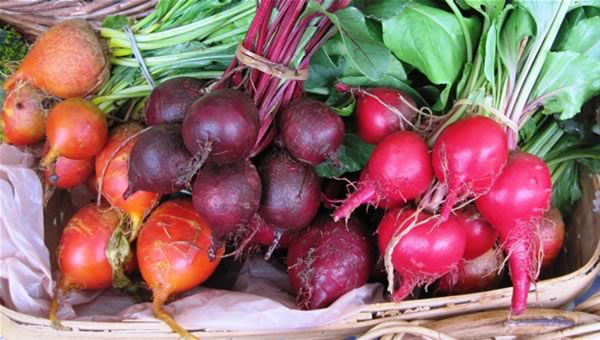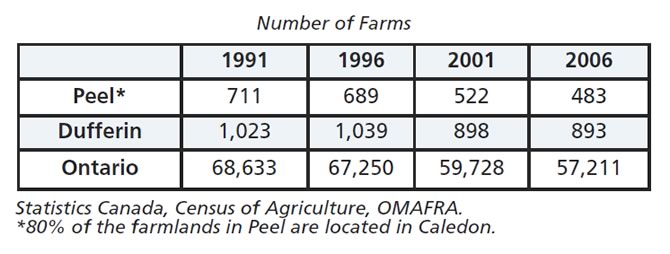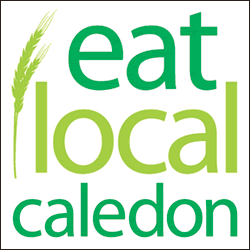Rural Roots

How important is our rural life?
Historically, agriculture was the way of life in Headwaters and continues to be seen as a valued cultural component of the community. In fact, Headwaters includes some of the best agricultural land in the country. Its close proximity to markets in nearby cities and the second largest North American food processing economy in the Greater Toronto Area makes the land a valued resource both for food and economic development. Despite this, the viability of local farming and protection of rural lands are threatened.
Hightlights
- Headwaters includes some of the best agricultural land in the country. Our close proximity to markets in nearby cities and the second largest North American food processing economy in the Greater Toronto Area makes the land a valued resource both for food and economic development.
- The number of farms in the Headwaters has continued to decrease dramatically, from 1,734 to 1,376 over the past two decades. However, sales of main livestock and crop commodities in Headwaters totaled a still-significant $143.8 million in 2006.
- Private, commercial and public interests have different and often conflicting priorities and goals for land use and these have created tension within the community.
- There is a rising demand for local food and an increasing awareness that access to healthy local food sources is critical to community sustainability.
- What can we do to support local farmers in remaining viable?
“There is a living connection between rural communities of this country and cities of this country, but unfortunately the cities have internal gravity that calls all attention to them.”
– Rex Murphy
Viability of Agriculture
Agriculture is no longer the economic driver it once was in this region. In fact the number of farms has continued to decrease dramatically, from 1,734 to 1,376 over the past two decades. However, sales of main livestock and crop commodities in Headwaters totaled a still-significant $143.8 million in 2006*.
* 2006 Census of Agriculture and Economic Development Policy Branch, OMAFRA Jan-09
Eat Local Caledon
Eat Local Caledon, a program supported by Caledon Countryside Alliance, works hard at making it easier to eat locally grown foods. Their many efforts include school and youth gardening, farming and cooking programs, farmers’ markets, locally inspired cooking classes, monthly eat local dinners, Eat Local Month in September, the Albion Hills Community Farm, annual farmer-chef trade meetings, and the Who’s Servin’ Local program, which recognizes Caledon shops, cafes and restaurants that are serving local food.
The Agricultural Dilemma
There are farmers in Headwaters with land, skills and knowledge, but no one to take over the farm when they retire. At the same time, there are young people and new immigrants with a desire to farm, but few skills or no land. That’s the dilemma that local programs such as FarmStart in Brampton and Everdale’s Farmers Growing Farmers Program near Hillsburgh are helping to resolve. Both offer skill-building programs for those who want to improve the sustainability of their farms or to become farmers. In addition, Farmstart supports a service that links new farmers with experienced farmers who have land available or expertise to share.
Perhaps as important, agriculture remains a significant element in the way our community defines itself. Yet the high cost of farming makes it difficult to maintain a viable business. The average farm income in Canada has been declining steadily since the mid-1970s. About 44% of farmers take on other jobs to support themselves, with nearly 20 % holding full-time jobs off the farm. Some efforts are underway to support agriculture, but more needs to be done to keep it a viable sector in Headwaters. Emerging Opportunities for Economic Development Niche specialty markets in organic foods and foods that cater to the cuisine of an abundant and growing immigrant population in the GTA provide promising opportunities for those in the agriculture and agri-food sectors, as does agri-tourism. Headwaters is an equine destination hotspot, and many of the pieces are in place to position the area as a destination for culinary tourism.
Emerging Opportunities for Economic Development Niche specialty markets in organic foods and foods that cater to the cuisine of an abundant and growing immigrant population in the GTA provide promising opportunities for those in the agriculture and agri-food sectors, as does agri-tourism. Headwaters is an equine destination hotspot, and many of the pieces are in place to position the area as a destination for culinary tourism.
Local Food
There is a rising demand for local food and an increasing awareness that access to healthy local food sources is critical to community sustainability. Farmers in the Greenbelt have eight million consumers within close proximity.
Local Farmers’ Markets
Inglewood, Bolton, Orangeville, Amaranth, Rosemont, Grand Valley, Hockley Valley Resort, and throughout the countryside.
 Food In The Hills
Food In The Hills
Food in the Hills magazine is made available in May and August and raises awareness and celebrates everything to do with food in our own backyard. It’s about who grows it, who serves it, where to find it, and how to cook it. It’s about dining in and dining out. It’s about growers, grocers and everyday gourmets.
Learn more at www.foodinthehills.ca
Community Supported Agriculture (CSA)
Farms with CSA programs receive a set fee from consumers prior to the start of the growing season in return for shares (produce) in the farm’s bounty. Caledon CSAs: Whole Village Sustainable Farm, Honey Hills Farm, Albion Hills Community Farm and Peace Ranch. Dufferin CSAs: Landman Gardens and Breaking Ground CSA, and Everdale is close by in Hillsburgh.
Land Use
“Open vistas, rolling hills, rivers, trails, green space and local farmers/produce.”
These phrases were used by survey respondents to describe what they valued about their home. However, we don’t all agree on how our lands should be best used, or preserved. Private, commercial and public interests have different and often conflicting priorities and goals, and these have created tension within the community.
Along with municipal official plans and conservation authority regulations, development in large portions of the Headwaters region is regulated by provincial plans for the Greenbelt, the Oak Ridges Moraine and the Niagara Escarpment, as well as by Places to Grow: Growth Plan for the Greater Golden Horseshoe.
Current land use debates in Headwaters
Agriculture: food security through farmland protection vs. economic sustainability of farms
Aggregate extraction: local jobs vs. environmental impact on water and natural landscapes
Wind turbines: reduction of environmental footprint vs. impacts on residents’ health and landscape vistas
Population growth: provincially mandated population growth targets vs. environmental sustainability
Learn More…
Read up on relevant reports and links >
 Headwaters Communities in Action
Headwaters Communities in Action









